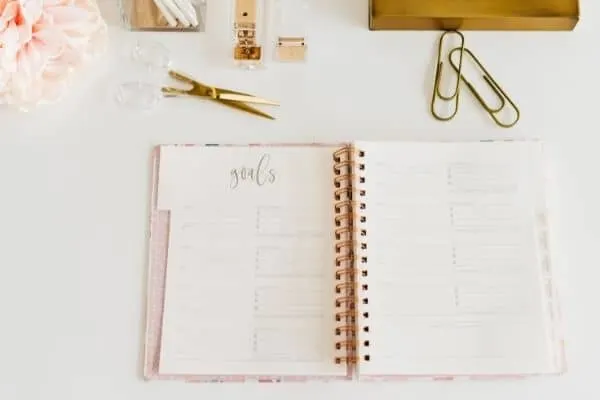If you are new to goal setting, you might be wondering how to take the first step. Perhaps you’ve heard that those who write goals down are much more likely to achieve them than those who don’t, but you need an action plan. If you’re ready to start setting and tackling goals, this list of 50 goals to set for yourself is the best way to get started.

Affiliate disclosure: This post may contain affiliate links, which means we may receive a commission if you click a link and purchase something that we have recommended. Please read our disclaimer for more details.
Why Set Goals for Yourself?
Goals are a great way to give your life a push in the right direction. They help you articulate the future you envision and break it down into small steps that will take you over the finish line.
In their most basic form, your goals are a list of things you want to do or accomplish within a certain timeframe.
There are several benefits to setting both short-term and long-term goals.

First, defining clear goals helps you make better decisions. When you know what path you are on, it’s easier to stick to that path. When new opportunities present themselves, you can evaluate them with reference to your goals and see if they’re a good fit. If not, saying no becomes a lot easier.
Second, there is growing evidence to show that those who take the time to write down their goals accomplish significantly more than those who either don’t have goals or do not write them down. If you are someone who is committed to long-term personal and professional growth, you need to set some goals.
Finally, writing your goals down and figuring out what needs to happen to achieve them helps you prioritize your time and take the right steps for you at this point in your life.
However you define success, committing to your goals is a surefire way to get there faster.
Questions to Ask Yourself Before Setting Goals
When setting goals, I like to work backward from the long-term, big picture vision of my life down to the nitty grit list of things I need to do right now.

Someone once told me, “We overestimate how much we can get done in a day, but underestimate how much we can get done in a year.”
I have found this to be so. On a day-to-day basis, I rarely finish all the things I set out to do. But when I look at my accomplishments over the course of a year, I’m able to see great progress.
For example, the other day, I was feeling a bit down because I felt like I wasn’t accomplishing anything. So, I made a list of everything I had done in the last year, and by the time I finished, I realize I was worrying about nothing. I was on track for accomplishing my list of goals for the current time frame and had actually done even more than I’d hoped.
So, as you start to think about the types of goals you’d like to set for yourself, there are some helpful questions you can ask.
- Where do you see yourself in ten years? Five years? One year?
- What is your ultimate goal in life?
- What does the best version of your life look like?
- What stepping stones will you need to get there?

In his book and course, Hero on a Mission, Donald Miller recommends starting at the very end of your life and working backward. What would you want people to say about you in your obituary?
I know this sounds morbid, but it’s an extremely effective exercise. Once you know what you would like people to say about you at the end of your life, it’s a lot easier to figure out what you need to do to live a life that aligns with that vision.
Whether you start that far down the line or just ten years out, answering these types of questions is the best way to discern the most important goals for you.
How to Set Smart Goals
If you have studied goals at all, you’re almost certainly familiar with the concept of SMART goals. Most resources I’ve encountered on goal setting teach this method or something very similar.
As a reminder–or a brief intro if this idea is new to you–the most successful goals are those that are:
- Specific
- Measurable
- Achievable (sometimes noted as Attainable or Actionable)
- Realistic (also sometimes given as Relevant)
- Time-Bound
The best way to demonstrate this is through an example. Let’s take the following goal: I want to be a good singer. As it stands, this goal might be realistic and perhaps even attainable, but it’s not a goal we can measure easily. We won’t have any way of knowing when or if we’ve achieved it.
Here’s how we can improve it:
| Definition | Example |
| SPECIFIC: A specific goal gives a clearly defined outcome. | I want to be able to sing Presto avvertiam Susanna from Le Nozze di Figaro. |
| MEASURABLE: A measurable goal should have a clear metric by which to measure progress. | I want to sing Presto avvertiam Susanna in my Level 9 RCM exam. OR: I want to perform Presto avvertiam Susanna in a voice recital. |
| ACHIEVABLE: An achievable goal is one that you have a reasonable chance of achieving. If you’ve never sung opera before, perfecting a Level 9 aria might be an unattainable goal at the moment. | I want to sign up for voice lessons and perform in my first recital. |
| REALISTIC: Realistic goals should make sense in the overall vision for your life and in the context of everything else you have going on. If you just had a new baby or are starting a new job, is it realistic for you to take up a new, time-consuming hobby at this juncture? | I want to carve out 30 minutes per day so I can practice singing. |
| TIME-BOUND: A time-bound goal has a specific deadline attached to it, which heightens focus and gives you a concrete timeline to work with. | By the end of this year, I will have found a way to set aside 3 hours/week and $200/month so I can start taking voice lessons. |
As we worked through this process, we’ve navigated our way toward a goal that is specific, measurable, achievable, realistic, and time-bound. This final goal (By the end of this year, I will have found a way to set aside 3 hours/week and $200/month so I can start taking voice lessons) is much easier to take action on and measure than our original goal (I want to be a good singer.)
It’s also more realistic and achievable than our first two examples in the table above.
Tips for Successful Goal-Setting
When it comes to achieving your personal goals, there are a few things you should do to set yourself up for success.
Dream Big
When you begin this process, the first thing to do is to dream big. Write down all the big goals you can think of. This is not the time to put limitations on yourself.
Don’t just think about your short-term goals, but consider your future goals as well. Many of your short-term goals will be stepping stones toward your bigger life goals, so you’ll want to get those all down on paper before you start narrowing things down.
Start Small

At the same time, you’ll have a better chance at achieving those bigger goals if you start small.
If you’ve never trained for a race before, competing in a marathon may not be the first goal you want to set. A more attainable goal might be to join a running club or participate in a five-kilometer race.
Achieving a small thing like this will give you a sense of accomplishment and will help you make progress toward your big goals. Also, if you’re new to goal setting, don’t try to take on ten or twenty new goals at once. Instead, choose two or three to start with for the first few months and then reevaluate in several weeks’ time.
Make a Plan
As soon as you commit to a goal, make a plan for how you’re going to achieve it and how you will measure your progress. What stepping stones will you need to step over to get to your final goal? How will you tackle them?
Will you wake up thirty minutes earlier each day to train? Will you get an accountability partner? These plans must be put in place upfront to achieve success in the long run.
Reward Yourself
Nobody can stay motivated to do hard work all the time if there is never any payoff. If your goals are on the larger side, you’ll want to have milestones along the way where you reward yourself for your progress. This will provide the motivation you need to keep going.
Monitor and Adjust
As you go, you’ll want to have a system for monitoring your progress. I like to use a daily habit tracker, a monthly habit tracker, and a goal-setting spreadsheet.

That may be overkill, but it helps me track smaller goals such as developing new habits, as well as larger goals, like a significant career accomplishment. Some goals may even warrant their own spreadsheet or notebook for tracking.
Many goals, such as those relating to fitness and health, can also be tracked using a mobile app.
50 Goals to Set for Yourself
So, without further ado, here are fifty goals to set for yourself in the following areas:
Goals for Your Personal Life
Personal Development
1. Develop New Skills
Life is more interesting when you’re constantly learning new skills. Take a cooking class, learn to code, take up photography.
Sample goal: This summer, I will take a French cooking class and host a French-themed dinner party for my friends.
2. Seek Out New Experiences
There are so many wonderful new experiences awaiting each of us, and we risk missing out on them if we get too stuck in our current patterns and rituals. Make a point of trying a new thing every once in a while, whether that’s eating at a new restaurant, going to hear an author you’re unfamiliar with speak about their book, or joining a book club.
Sample goal: This month, I’m going to try Korean food for the first time.
3. Become a Lifelong Learner
For a lot of people, school was a boring place that robbed the joy from the learning experience. Fortunately, as adults, learning never has to be dull. We can develop an interest in a new topic and pursue it to our heart’s content.
Follow rabbit trails, watch documentaries, go to museums, take loads of books out of the library. Learning is a gift in and of itself when you’re the one who gets to steer the ship.
Sample goal: I want to learn more about Egyptology. By the end of the year, I will have read four books, watched two documentaries, and visited a museum exhibit on this topic.
4. Take Time to Ponder Big Decisions
Impetuousness and rash decisions can lead to poor choices and regrets. If you’re someone who likes to rush into things without doing your due diligence, try setting a goal of taking at least twenty-four hours before making any big decisions.
Sample goal: I will take at least twenty-four hours to make decisions about anything that will cost more than $200 or take more than five hours of my time.
5. Learn to Be Less Reactive
Our shortening attention spans and the lightning speed of modern communication make it possible for us to respond immediately to everything that happens in our lives, even when there’s no real sense of urgency.
Taking time to process difficult or emotionally charged situations, allows you to find perspective and respond appropriately. If you’re used to responding instantly to every situation, it could be worthwhile to build up an internal delay mechanism that lets you think things through before reacting.
Sample goal: I will think through emotional situations for at least twenty-four hours and will not deliver my response electronically.
6. Learn a New Language
Learning a new language offers many benefits besides equipping you to travel to another country. For example, it can improve memory function, creative thinking, and problem-solving skills.
Sample goal: This year, I’ll join a French-speaking club and will take lessons on Duolingo for twenty minutes a day.
7. Practice Perseverance
A good way to ensure that you build up the stamina to see your goals through is to develop greater perseverance. Good goals usually take more time and effort to accomplish than we initially expect them to. If we lack perseverance, we are more likely to give up before we see our plans through.
Sample goal: I will reevaluate my goals on a daily basis and encourage myself with positive self-talk and rewards. I will keep a record of my accomplishments to remind myself of the payoff for perseverance.
8. Shake Bad Habits
Most people have at least one bad habit they’d like to kick. This could be an addiction to junk food or too much time spent on social media. Whatever it is, a bad habit can be really hard to shake, but doing so can bring freedom, and the self-discipline gained will aid you in achieving all your other goals.
Sample goal: By the end of the month, I will have set a 20-minutes-per-day limit on my social media use and will use time limits settings on my devices to enforce this.
9. Form Good Habits
As you start to kick those bad habits, you’ll probably want to replace them with better ones. Forming good habits is also challenging, but the rewards are often more immediately noticeable. There are many ways to develop good habits. One of my personal favorites is using a habit tracker.
Sample goal: I will write in my journal for ten minutes, four times a week.
10. Develop a Growth Mindset
Carol Dweck defined a growth mindset in the Harvard Business Review as the belief that one’s talents can be developed through hard work, good strategies, and input from others. A fixed mindset, on the other hand, is a belief that our talents are innate and will remain as they are and always have been.
While each person possesses a mix of both of these mindsets at any given time, the more you believe that your hard work and effort will contribute to your success, the more likely you are to keep putting in said effort (and thus to achieve that success).
An effective way to develop your growth mindset is to keep a journal where you record, among other topics, the things you are working on, the results you’re seeing, the challenges you face, and your attitudes toward all of these. Over time, you’ll notice patterns emerging. Paying attention to these patterns will help you shift your mindset.
Sample goal: For the next three months, I’m going to keep a journal where I record my efforts, obstacles, and progress.
11. Live Authentically
Life is too short to spend it trying to be someone you’re not. Be honest with yourself. Get to know yourself on a deeper level through journaling and/or reflection, and make it a goal to act in accordance with your true nature, values, and beliefs.
If this is an area of development for you, try to identify one specific behavior you can work on changing.
Sample goal: This month, I’m going to stop laughing when my friends make jokes that make me uncomfortable.
12. Believe In Yourself
When you suffer from crippling self-doubt or insecurity, believing in yourself is much easier said than done. But without a healthy dose of confidence, you may lack the courage to take the necessary steps toward achieving your bigger goals.
To build up your self-belief, start keeping a record of your accomplishments and the goals you’ve achieved. This doesn’t mean you have to build yourself a trophy wall. But celebrating your wins–both big and small–is an important part of establishing confidence and courage.
When you’re feeling paralyzed by fear of failure, reading through your list of achievements will remind you that you’ve tackled equally daunting challenges in the past and overcome them, and you can do it again.
Sample goal: This year, I will keep a record of the goals I set and their outcomes, and I will take time to celebrate my wins along the way.
13. Overcome Your Anxiety
Persistent anxiety can be debilitating. Its symptoms–e.g., restlessness, poor concentration, irritability, fatigue, fear, insomnia, and panic attacks–make it difficult to get through the day, let alone focus on your personal growth goals.
There are many sources of anxiety, and the journey to overcoming it may require identifying its root causes. For some people, having too much time on their hands leads to anxiety. For others, the opposite is true.
While people can be predisposed to anxious thinking, other common causes include exacerbating personal circumstances, avoidance of difficult topics, negative thinking, and selective memory.
Treatment options include lifestyle changes, counseling, and medication. This article from Very Well Mind gives an excellent overview of steps you can take right away to combat anxiety.
Sample goal: This spring, I’m going to spend at least one hour a day in nature.
14. Conquer Your Fears
Fear is one of the biggest things holding most of us back from achieving our goals. Whether it’s fear of failure, fear of success, or something in between, fear has a way of creeping in and immobilizing us.
Taking action toward conquering your fear will have a positive impact on your overall health and well-being, and will set you up for success in achieving your goals.
Sample goal: This month, I’m going to find an accountability partner with whom I can discuss and overcome fears.
15. Identify Your Passion(s)
If you’re struggling to decide which goals to set for yourself, it could be that you haven’t narrowed down your primary passion(s) yet. Once you know what brings you the most joy, setting goals becomes easier because you are driven to go after that thing with fervor. If you’re not sure where to start, this article may help.
Sample goal: I will spend one hour a week exploring current and new interests to find out what really drives me.
Productivity Goals
16. Improve Your Time Management
Getting better at time management is one of the most effective ways to become more productive. Whether you’re using your morning hours more wisely or getting intimately acquainted with the Pomodoro technique, using time well is always a worthwhile goal.
Sample goal: I will use Google Calendar to try time blocking for one month.
17. Set High Standards, but Understand GETGO
High standards are great, but not if your perfectionism is getting in the way of getting things done. We want to aim for progress over perfection.
My pastor introduced me to this term–GETGO–a few years ago, and I still reference it weekly. It stands for “Good Enough To Go Out,” and adopting it as a motto will help you get things done faster than ever before.
Sample goal: I will allow myself to call something complete when it only feels ninety percent done.
18. Be More Productive with Your Time
If you’re constantly short on time, there’s a good chance you’re doing too much. I always advocate for taking a good, hard look at what’s on your plate if you find yourself in this situation and seeing what you might be able to let go of.
However, if you’ve scaled back as much as you can and still find yourself short on time, try finding ways to be more productive with your time. Listen to an audiobook while doing chores or run an errand while you’re waiting to pick your kids up from dance class.
A word of warning though: while efficiencies like these are great, don’t overdo it. You don’t want to get to the point where you feel like every waking moment needs to be productive. Give yourself time to just rest and remember that you’re a human being, not a human doing.
Sample goal: I will remove distracting apps from my phone so I can use my “waiting time” to read, rather than kill time.
19. Create a Minimalist Wardrobe
The Paradox of Choice purports that having too many choices contributes to indecision, and this problem often manifests itself in our wardrobes. By limiting the options available to you, you make it infinitely easier to decide what to wear each morning.
Check out my favorite capsule wardrobe program here.
Sample goal: I will cultivate a capsule wardrobe and pre-plan thirty outfit options for this month.
20. Learn to Prioritize Tasks
If you’re a doer, chances are your task list is much longer than the time you have allocated for tackling those tasks, so you need to prioritize. Categorizing your tasks as important, urgent, and not important will help you focus on the things that matter most. Once you get these done, you can take on the other tasks if you still have time.
My Weekly Prioritization Exercise can help with this.
Sample goal: I will prioritize my weekly tasks every Sunday night.
21. Stop Procrastinating
We all have something we’ve been putting off…something we know needs to be done but we just don’t feel like doing it. The problem is, the longer we avoid it, the more stress it causes. While you may work best under pressure, there are some tasks that don’t have a natural deadline built into them, and unfortunately, these are often the things that we probably should be working on.
Have you been wanting to start writing a novel? Learn to play the piano? Make a career change?
What’s holding you back from doing so?
Spend some time reflecting on the obstacles that stand in your way, and then make an action plan to help you overcome them so you can start making progress toward that ultimate goal.
Sample goal: In March, I will sign up for a 12-week novel writing course and I will write the first 50,000 words of my novel.
Financial Goals
22. Create a Monthly Budget
Operating without a budget is like driving to a place you’ve never been without a map or directions. You know where you want to go, but you have no idea whether or not you’ll get there.
If you don’t already have one, start by tracking your monthly spending to see where your money is currently going. After you’ve done that for a month, add up all the categories and use this as a basis for your new monthly budget.
Sample goal: By the end of August, I will create a monthly budget for our household.
23. Start a Side Hustle
Side hustles have become so common, they should probably get a new name, like “work required to afford this overpriced home.” However, side hustle has a much nicer ring to it.
In any case, having a gig you do on the side can bring in extra income, help you build skills and community, and eventually lead to a career that is more aligned with your long-term goals.
If you’ve got some time to spare, why not start a blog, an Etsy store, or a YouTube channel? Or, if creating isn’t your thing, take on work as a freelancer, a dogsitter (puppy cuddles!), or a personal shopper. People are desperate to outsource any and all tasks these days, so if you have something you love doing, there’s a high probability you can turn it into an income-generating opportunity.
Sample goal: This year I’m going to start an Etsy store and list ten products.
24. Build an Emergency Fund
If the last two years have taught us anything, it’s that life is unpredictable. Unexpected expenses or loss of income can occur at any time. Having an emergency fund to cover basic living expenses or any other urgent or important thing that pops up is key to establishing financial stability and peace of mind.
Sample goal: This month, I will set up an automatic weekly deposit into my savings account.
25. Tackle a Debt
If you have more than one type of debt, the thought of getting it all paid off might be more than you want to imagine right now. It’s often better to start by tackling just one source of debt–a high-interest credit car, for example–than to try and pay down everything simultaneously.
Sample goal: I will pay $100/month over and above the minimum payment on my high-interest credit card until it is paid off.
26. Set Up Regular Retirement Plan Contributions
If you are in your 30s or 40s, now is the time to start contributing heavily to your retirement plan if you aren’t already. Even small contributions can add up big-time between now and retirement, thanks to the effects of compound interest. Plus, if some of your retirement holdings are held in stocks and other investment products, you could see even higher gains there.
In fact, consider this a bonus goal: if you are not already educated about investment strategies, make it your goal to start studying this important topic as soon as possible. Money that’s strategically invested can be earning profits for you around the clock, probably more so than your side hustle!
Sample goal(s): I will set up a $200/month contribution to my retirement fund.
I will take one course or read one book about investment strategies each quarter.
27. Rethink Your Relationship with Money and Possessions
So many of our decisions in life are driven by our financial circumstances. Where can we afford to live? Which job will pay us best? What things can we afford to buy? How do we stay out of debt? How do we save for our future?
These are all important questions, but if we’re not careful, money can become the sole determinant of most variables in our lives.
Money is an unkind master, so as far as it’s within our capability, we should not allow ourselves to become slaves to it. This means avoiding debt, living within our means, and being content with less. If we can cultivate a mindset and a lifestyle that puts money in the backseat, it will free us to live more authentically and prioritize the things that matter most: family, friends, making a positive impact on the world, etc.
Sample goal: I will attempt a buy-nothing month this year.
28. Develop an Abundance Mindset
In 1989, Stephen Covey, in his book, The Seven Habits of Highly Effective People, introduced the concept of an abundance mindset. He defined it as “a concept in which a person believes there are enough resources and successes to share with others.”
People who live with an abundance mindset are grateful for what they have. They feel happier, more satisfied, and more creative than those people who operate from a scarcity mindset.
Some ways to develop an abundance mindset are to:
- Focus on what you have and practice graditude
- Surround yourself with people who exhibit an abundance mindset
- Cut down on your belongings and donate the excess
- Seek out ways to be more generous
Sample goal: I will install a gratitude app on my phone and record my positive thoughts throughout the day.
29. Get Life Insurance and Disability Income Insurance
Be prepared for unforeseen circumstances by arming yourself with adequate insurance. If you are responsible for providing for your family, you can give them and yourself peace of mind, knowing that they’ll be taken care of if you’re no longer able to do so.
Sample goal: I will get three quotes on life insurance this month.
30. Create a Will
Again, this isn’t a topic we necesarily like to talk about or think about, but it’s an important task to take care of. If you don’t have a will set up yet, let this be the year you change that.
Sample goal: I will make an appointment to discuss my will with my lawyer.
Mental Health Goals
31. Prioritize Self-Care
When you’re super focused on taking care of everyone else, self-care tends to all on your priority list. If your health is suffering, or if you’re feeling tired and stressed all the time, a little self-care will go a long way to restoring balance in your life.
Sample goal: I will spend 30 minutes a day taking care of my own health and well-being.
32. Find New Ways to Manage Stress
Stress is endemic in our times. In 2018, a large mental health study in the UK found that 74% of people had felt so stressed in the past year that they were overwhelmed or unable to cope. I imagine that number is even higher now.
Stress is a serious problem that can lead to depression, burnout, and even self-harm. If you feel your stress levels are out of control, this is a key area in which to focus your efforts this year.
Sample goal: I will analyze the sources of my stress and cut out three stress-inducing activities or commitments from my life this month.
33. Spend Less Time Online
The Internet and social media offer 24/7 entertainment, information, and distraction. But too much of a good thing is, well, a not-so-good thing. Spending too much time online can cause insomnia, isolation, guilt, depression, and a feeling that you are never free.
Sample goal: I will set up time usage limits on my devices and abide by them.
34. Practice Gratitude
Gratitude is the act of being thankful for what we have in our lives. It requires us to look outside of ourselves and our immediate circumstances and take notice of details that we might otherwise miss.
Practicing gratitude gives you a greater sense of perspective and helps you focus on what you do have, rather than on what you don’t, it connects us with ourselves and others, and it can reduce depression and anxiety.
Sample goal: I will start a gratitude journal this month and write in it every morning.
35. Take Time to Process the Past
Everyone has experienced painful events in their childhoods and/or early adult years but, too often, the pain caused by these events remains unaddressed. Unresolved childhood trauma can burden us with anger, sadness, shame, and fear that we carry around until we learn to heal from our old wounds.
This article offers a nine-step process for healing emotional wounds. However, if your wounds are too deep for you to process on your own, I highly recommend seeking professional help. A trained counselor can guide you through this process and help you develop strategies for letting go of the past and processing new hurts right away so they aren’t left to fester.
Sample goal: This month, I will start working through one event in my past that left me with unresolved pain, either on my own or with a counselor.
36. Set and Enforce Personal Boundaries
In many ways, enforcing personal boundaries is the logical next step after you’ve healed past traumas. By establishing boundaries that protect your physical, mental, and emotional health from people who don’t respect them, you are essentially saying, “I’ve done the work to heal myself from old hurts. Now I’m doing to work the protect myself from getting hurt in the same way again.”
Sample goal: This year, I will develop a process for evaluating new requests for my time, and will get more comfortable with saying ‘no’ when a request does not line up with my existing schedule or plans.
Physical Health Goals
37. Eat Healthier
This is probably one of the most popular goals to set for yourself. Every year, after the feasting of the holiday seasons, millions of people resolve to eat healthier going forward. And yet, fast food businesses are still thriving.
Why?
Because this is a really hard change to make. For many reasons–stress, lack of time, habit, desire–we fall back into our regular eating patterns not long after making our initial changes.
One reason why so many dietary redirects fail is that people try to change too much at once. Unless you have extraordinary willpower or a medical condition that necessitates a drastic overnight change, it’s probably not reasonable to give up gluten, sugar, and alcohol all at once, for example.
Instead, focusing on small changes over time allows your body to adjust and perceive the benefits of the new eating habits. It will naturally begin to crave healthier foods as it gets used to them.
Sample goal: I will start filling half my plate with vegetables at each meal.
38. Drink More Water
Drinking an adequate amount of water is key to maintaining good health and preventing all kinds of physical ailments. Water helps carry nutrients and oxygen to your cells, flushes bacteria from your bladder, aids in digestion, and helps you maintain your electrolyte balance, among other things.
Sample goal: I will use a tracking app or printable to ensure I’m drinking the right amount of water each day.
39. Create a Fitness Routine
Working out regularly gives you more energy, develops your physical strength, and protects you against injury. You don’t need an expensive gym membership to develop a solid fitness routine. These days, there are hundreds of online fitness and yoga programs to suit every need.
Find a routine that works for you and aim to complete it three or four times per week.
Sample goal: I will exercise for fifteen minutes, three times a week.
40. Develop a Healthy Morning Routine
People often wonder how they can accomplish all they need to do and still have time for themselves. It is possible, but not without a healthy morning routine. Starting the day right sets the tone for the day, making everything seem possible.
Sample goal: I will develop a healthy morning routine, test it for one month, and adapt it to fit my needs.
41. Wake Up Earlier
Waking up earlier could be the key to accomplishing many of your other goals. Early risers tend to be more productive and have more time and energy for their morning routine, exercise rituals, and eating a healthy breakfast. The quiet of the morning also lends itself well to meditation, journaling, and reading.
Sample goal: I will wake up one hour earlier than I need to.
42. Set a Bedtime for Yourself
This is a corollary of the previous goal. Getting up early generally requires that you maintain a regular sleep routine and go to bed at an earlier time too. Keep devices out of your bedroom and aim to shut down early enough that you can get a solid seven or eight hours.
Sample goal: I will go to bed by 10 pm.
Attitude Goals
43. Develop a Thick Skin
One way to maintain a more positive attitude is to develop a thick skin, particularly when it comes to constructive criticism. It’s never easy to hear that you have room for improvement, but once we accept that we all have room to grow, receiving criticism comes much easier. We can even take it a step further and intentionally seek out criticism from people we admire in a proactive effort to develop more.
Sample goal: I will ask three people for feedback this month and will receive their criticism with gratitude and an open mind, seeking opportunities to grow.
44. Don’t Accept Toxic Behavior from Yourself or Others
Toxic behaviors usually involve people being subtly or outwardly manipulative, self-centered, needy, or controlling. When people act this way, they cause stress and anxiety for those around them, and they make it hard for people to develop close relationships with them.
If you are dealing with toxic behaviors from people in your life, set boundaries to protect yourself, and have the tough, but necessary, conversations you need to have to either end the behaviors or put distance between you. However, don’t be afraid to examine yourself from time to time and make sure you are not falling into any of these patterns yourself.
Sample goal: The next time this person has a crisis, I will recommend a place they can get help with it, but I will not try to fix everything myself.
45. Forgive Yourself and Others
Holding onto past hurts, whether inflicted by yourself or others, is never healthy. The more you let a negative situation fester, the more pain it’s going to cause everyone involved. If you have had a falling out with someone, and you’re still dwelling on it, it might be time to take steps toward forgiveness.
Sample goal: I will apologize to the person I wronged and try to make amends.
46. Nurture Optimism
While optimism and pessimism are usually portrayed as inborn traits with people falling into one of the two categories, they are actually attitudes you can learn to develop. If you find yourself being overly pessimistic–assuming that the worst will happen, blaming yourself for negative circumstances outside of your control, chalking success up as flukes–you can take steps to change your attitude.
Analyze your thoughts and feelings around emotionally charged events. How do different outcomes make you feel? What are the thought processes behind your feelings? Look for negative patterns and write down truths you can speak over them to turn your unhelpful thoughts around.
Sample goal: When I find myself dealing with strong emotions, I will journal about them and strive to understand the layers beneath them.
47. Develop a Positive Stance Toward Your Flaws
Being a perfectionist is an exhausting way to live. It’s also not realistic. As humans, we are all deeply flawed, and the sooner we can recognize that and embrace it, the better. Getting to know yourself and your weaknesses and learning to accept them or even turn them into strengths is so freeing!
Lean into your strengths and surround yourself with people who fill in your gaps and things will start to fall into place.
Sample goal: I will stop trying to be as good at baking as my sister is, and will instead bring a store-bought treat (or a bottle of wine) to family get-togethers.
48. Build Your Confidence
If you suffer from low self-confidence, you may be holding yourself back from doing the things you truly want to do and trying out new experiences. Sometimes this is because you worry you aren’t capable of doing those things, but it could also be that you’re afraid of what other people will think of you if you put yourself out there.
Pursuing many of the other goals in this article will help you build up your confidence. Record and track your accomplishments and progress. Reminder yourself of the things you were afraid to do, but did anyway. Take small steps toward trying new things, especially those that scare you. Build up your confidence a little bit at a time as you prove to yourself that you’re capable of more than you think you are.
Sample goal: I will try one new thing each month that scares me.
49. Be Mindful of the Present Moment
In our hectic lives, it is easy to get caught living in the past or the future, but the most important place for us to be is in the present. Mindfulness is the practice of living in the present moment, of being fully attuned to what is going on around you and experiencing it fully as it unfolds. Doing so improves physical and mental well-being, reduces stress and anxiety, and helps you enjoy life more.
Sample goal: I will practice a mindfulness meditation three times a day for five minutes.
50. Manage Your Expectations
One of the surest ways to be disappointed is to let your expectations get to high. The less you expect, the easier it is to be pleasantly surprised.
Does this mean you should drop your standards and expectations completely? Not at all.
But by managing expectations well–both yours and others–you stand the best shot at having favorable outcomes. One way to do this is to communicate well with others about expectations so everyone is on the same page.
In terms of managing your own expectations of yourself, try writing down what you actually expect of yourself, and then ask yourself if these expectations are reasonable. Would you expect them from anyone else? How would you feel if someone else imposed these expectations on you? If you find that your expectations are unreasonable, take steps to adapt them to something more realistic.
Sample goal: I will put my expectations of myself in writing and be willing to adapt if my expectations seem to be unreasonable.
If you’re ready to choose some goals to set for yourself and start working toward them today, grab our free download below. Use it to keep track of your goals and your amazing progress.
Good luck!

Sophie Agbonkhese is a writer, homeschooling mother of four, and a recovering overachiever (who occasionally relapses). She is the founder of My Cup Runs Over, a site dedicated to helping busy women simplify and enrich their lives. When she’s not writing or debugging websites, Sophie spends her time reading, dancing, bullet journaling, reading, gardening, listening to audiobooks, and striving fruitlessly to have a clean house for at least five minutes.

